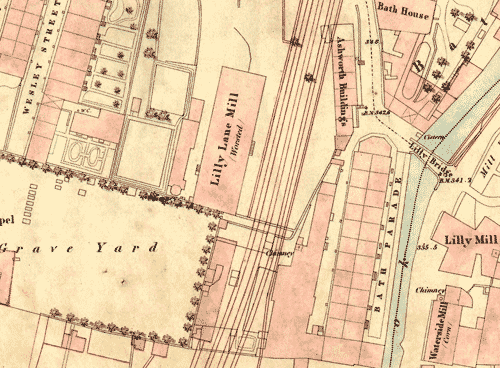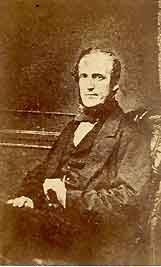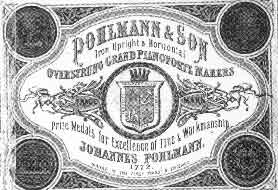Calderdale tends to be associated with the textile industry and the area does indeed have a rich history in this respect, if not always entirely positive, as evidenced by the case of the Lilly Lane boiler explosion.
In the second half of the nineteenth century, the municipal borough of Halifax became known as 'a town of 100 trades' and, in fact, there was a diversity of businesses and industries throughout the wider area.
As early as 1823, a firm in Halifax, Pohlmann and Son, was the only place outside London manufacturing pianos, while in Elland the very successful confectionary business, Dobson's, was established in 1850.
Dobson's of Elland
Sweet smell of success

Have you ever wondered about the sweet aroma drifting through the streets of Elland? Chances are that the smells emanate from the factory of Joseph Dobson.
The company was founded in 1850 and has been in the hands of the same family since then. Joseph, who had lost both of his parents in a York plague, learnt his trade as a confectioner in York.
Whilst living in York Joseph married Eleanor Berry who had family connections with the firm of Terrys. At the age of twenty-one, Joseph set out to claim an inheritance left to him by a relative in Elland. The inheritance comprised of money, land and property in Northgate.
Joseph and Eleanor went on to set up Dobson's, producing bride cakes, funeral biscuits and popular Victorian lozenges. These were known as conversation lozenges, which were inscribed with mottoes such as "Take Ye Not Strong Drink" and "Always Speak the Truth". They were scented with rose, vanilla or violet.
The business continued to thrive in Elland. Joseph and Eleanor went on to produce seven children. As a well-respected local businessman, the town was shocked when Joseph collapsed and died whilst running for a train. It fell to his children to take over the business.
His three sons took over the business in turn and by the 1930s the youngest, Thomas John was running the firm. Legend has it that it was Thomas John who was responsible for the creation of the famous Yorkshire Mixtures. The story goes that he was carrying trays of boiled sweets down the factory steps when he fell and the sweets landed in a colourful jumble! Yorkshire Mixtures are still produced today - complete with pear drops, herbal voice tablets and fruity fish.
In 1990, Yorkshire Television used the factory yard to recreate a Victorian slum as part of their drama series "How We Used to Live" and Dobson's was also filmed by the BBC as part of a history of the confectionery business.
Dobson's of Elland attracts over 6,000 visitors each year. It is possible to make bookings for groups to visit the factory and small museum. An opportunity to absorb wonderful childhood memories, not to be missed!
Lilly Lane Mill boiler explosion
One of the worst tragedies ever to hit the town of Halifax occurred in the afternoon of Friday November 29th 1850. Lilly Lane Mill, by the railway line between the old and new stations, was a worsted mill which had been extended, leaving the engine room, once at its southern extremity, in the heart of the complex.

The engine room housed three powerful boilers and above it were several floors, containing worsted spinning and other heavy machinery, at which women and girls were at work on the afternoon of November 29th. With little accompanying noise and as if out of nowhere, one of the boilers, with a huge lift, raised the floors above it to a great height, after which the mass of machinery, along with those working there, was thrown to the ground and buried among a vast heap of rubble. Eye witnesses confirmed how awfully and quickly the disaster occurred. Remarkably, some flooring remained standing and there were notable examples of children who had an extremely narrow escape. Ann Swift, along with five other young girls, on sensing that something was wrong, took refuge in the privy, from where they were later rescued by ladder. Others were not so lucky and there were an estimated twelve deaths, mostly children and young people, along with many more injured.
Prior to the explosion, there had clearly been problems with either the boiler or the engine, since work had been halted at the mill for several hours the previous day and the machinery was reported to have been running at an irregular speed. Some workers had in fact, stayed away on the Friday because of their fears on this matter. In the course of the Friday afternoon, the engine reportedly stopped three times before the explosion finally occurred.
The scene of devastation quickly attracted a great crowd, while the police and local worthies took charge and soldiers, civilians and a party of excavators attempted to clear debris and search for the dead and injured. Cheers accompanied the discovery of survivors, who were promptly transported to the Infirmary. The work went on after darkness fell and as long as five hours after the explosion, the crowd clapped heartily as a child, Rachael Jones, was rescued alive. Shortly after this, the disaster was compounded by the mill catching fire, but, as this had been anticipated, engines were at hand and the fire was soon brought under control.
Samuel, John and Isaac Firth were the occupiers and proprietors of Lilly Lane Mill and it was Samuel who had specific responsibility for the engine machinery, while Joseph Helliwell was the engine tenter, tasked with ensuring the safe working of the boiler. Samuel and Joseph appeared before the Yorkshire Spring Assizes in March 1851 charged specifically with the manslaughter of one victim, Sarah Ann Riddell, but they were found not guilty, in a one-day trial and acquitted.
Pohlmann's pianos
Hitting the right note

Surprising as it may seem, in the early 19th century Halifax was the only place outside London to manufacture pianos. The name of the firm was Pohlmann and Son.
In 1765, Johannes Christoph David Pohlmann, a native of Hanover in Germany, manufactured the first piano in England. In 1823 his grandson, Henry William Pohlmann (d.1874), came to Halifax to set up a piano making business.
No one is quite sure of the reasons for the firm to locate in Halifax, but it may be that they thought there would be plenty of custom from wealthy clothiers.
The workshops were located on Hall Street, whilst the first premises were situated on Commercial Street.
By 1830, the firm had moved to Waterhouse Street and later new showrooms opened on Princess Street opposite the White Swan Hotel.

The pianos were exported all over the world, especially to South America, New Zealand and Australia. The firm was innovative in producing pianos with overstrung iron frames. A rosewood "Piano d'Artiste" was advertised at a price of seventy guineas and hire purchase terms were offered at two guineas per month. Each piano came with a ten year guarantee!
The decline of the firm set in during World War One when then boss Henry Pohlmann refused to allow his works to be used for making ammunition. When the Radio and TV took over as the main forms of home entertainment the firm changed direction.
Pianos ceased to be made in 1931 and the firm began to sell electrical equipment.
The Pohlmann name as a business disappeared from the town in the late 1970s, but an example of one of the earliest Pohlmann pianos can still be seen in Shibden Hall (museums).